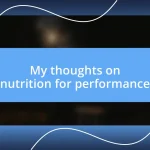Key takeaways:
- Nutrition significantly impacts athletic performance; understanding macronutrients and their timing is crucial for enhancing energy and recovery.
- Key nutrients for performance include carbohydrates, proteins, healthy fats, vitamins, minerals, and hydration, all integral for optimal energy levels and endurance.
- Proper timing of meals and snacks, along with recovery nutrition, can dramatically improve workout outcomes and recovery, highlighting the importance of planning and preparation.
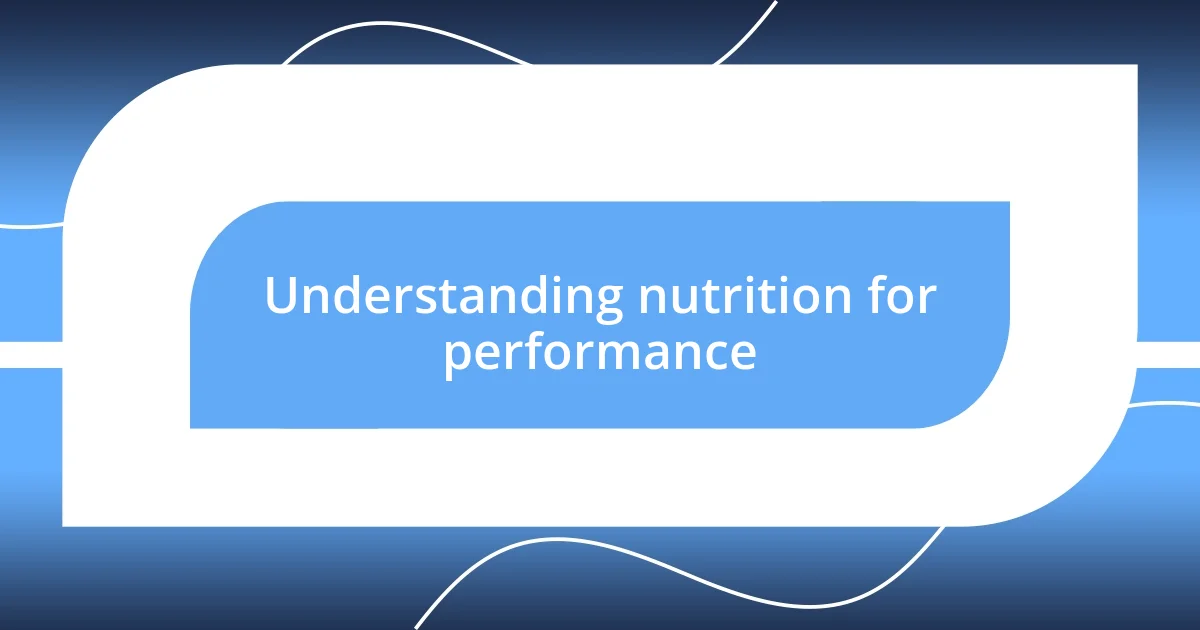
Understanding nutrition for performance
Nutrition plays a fundamental role in enhancing performance, and I can’t stress enough how pivotal it has been in my own athletic journey. During my early days of training, I often overlooked the importance of what I was eating, believing that sheer willpower would carry me through. But as I started to learn about macronutrients—carbohydrates, proteins, and fats—I realized that the right fuel not only boosted my energy levels but also improved my recovery times significantly.
Have you ever noticed how you feel when you indulge in a heavy meal right before a workout? It’s like trying to run a race with a boulder in your stomach. That’s why timing and quality of nutrition are crucial components for peak performance. Eating a balanced meal of complex carbohydrates and lean proteins before a session can dramatically enhance endurance and strength.
I remember a training cycle where I meticulously tracked my nutritional intake, and the results were staggering. I was faster on the track and more resilient during tough workouts. It taught me that understanding one’s nutritional needs isn’t just a nice-to-have; it’s a game-changer. If you’re looking to optimize your performance, why not take a closer look at what’s on your plate? Your body will thank you for it!
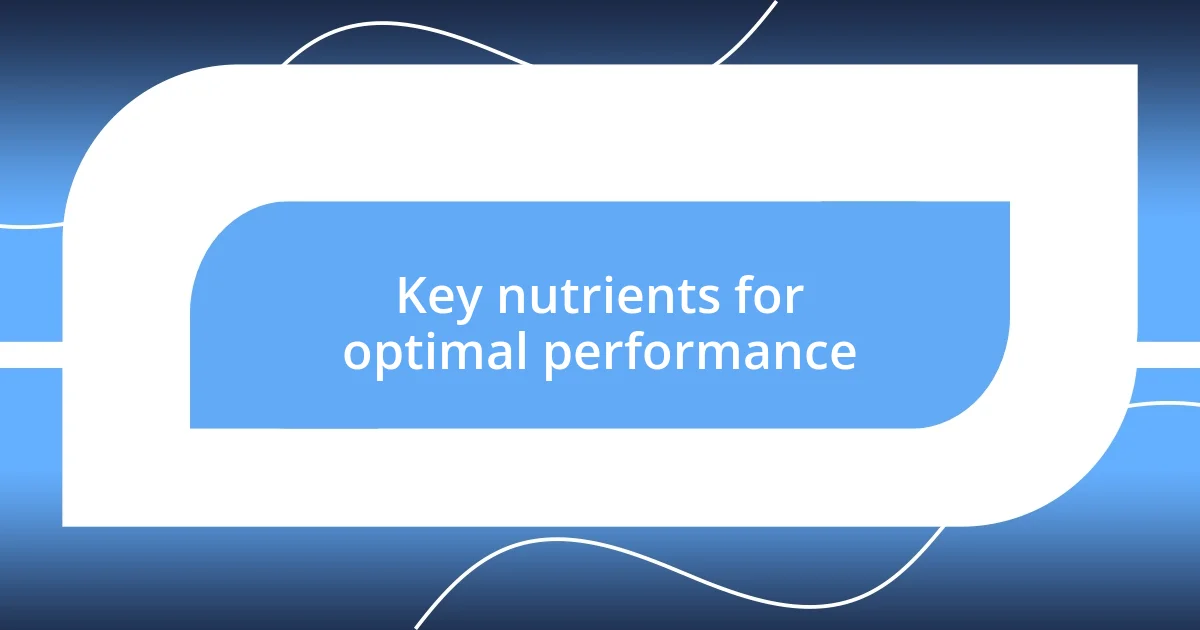
Key nutrients for optimal performance
When it comes to fueling performance, certain nutrients emerge as the unsung heroes. I’ve learned through my experiences that specific vitamins and minerals play crucial roles in optimizing not only energy but also endurance. For instance, during a particularly grueling phase of my training, I started focusing on iron-rich foods to combat fatigue—what a difference it made! It felt like someone had flipped a switch, allowing me to push through those last challenging reps with renewed vigor.
Here are some key nutrients I’ve found essential for optimal performance:
- Carbohydrates: The primary energy source for high-intensity workouts, fueling both the brain and muscles.
- Proteins: Vital for muscle repair and growth, especially after intense training sessions.
- Healthy Fats: Important for long-lasting energy and joint health, which can be critical during endurance events.
- Vitamins (B-complex): These nutrients aid in energy metabolism and can keep you feeling energized.
- Minerals (iron, magnesium): Essential for oxygen transport and muscle function; deficiencies can severely hamper performance.
- Hydration: Often overlooked, but staying well-hydrated is crucial for endurance and recovery.
As I became more attuned to these key nutrients, I noticed a direct correlation between how I felt during workouts and what I consumed prior. It’s incredible how proper nutrition can shift performance from average to extraordinary. So, if you’ve been feeling sluggish or struggling to achieve your personal best, check in with your nutrition; your body is definitely trying to tell you something.

Timing your nutrition intake
When it comes to timing your nutrition intake, I’ve found that a well-planned schedule can be just as crucial as the foods themselves. For example, I learned the hard way that consuming a big meal too close to training was a recipe for disaster. Once, after indulging in a hearty lunch right before a workout, I felt sluggish and unfocused, as if my body was battling against my own ambitions. That experience drove home the importance of timing. I like to eat a meal rich in complex carbs and lean protein about two to three hours before training. It provides me the energy I need without the heaviness that can drag me down.
I’ve also experimented with smaller snacks closer to workout times. About 30 minutes before hitting the gym, I often opt for a quick snack, like a banana or a handful of nuts. It’s light but enough to give me that extra boost without feeling weighed down. It’s fascinating how small adjustments in timing can lead to big improvements in performance. Have you ever tried adjusting your nutrition around exercise? If not, I highly recommend you give it a shot. You might discover a remarkable change in your energy levels and overall performance.
Lastly, let’s not overlook post-workout nutrition. Immediately after a session, I prioritize replenishing my body with protein and carbs. I remember savoring a protein shake mixed with banana after a grueling workout and feeling my muscles thanking me. The recovery that followed was profound, demonstrating that timing isn’t just about pre-workout meals; it’s also essential afterward. By being mindful of when you eat, you’ll supply your body with the nutrients it craves, significantly enhancing recovery and overall performance.
| Pre-Workout Timing | Best Practices |
|---|---|
| 2-3 hours before | Meal with complex carbs and lean protein |
| 30 minutes before | Light snack (e.g., banana, nuts) |
| Post-Workout | Protein and carb-rich recovery meal or shake |
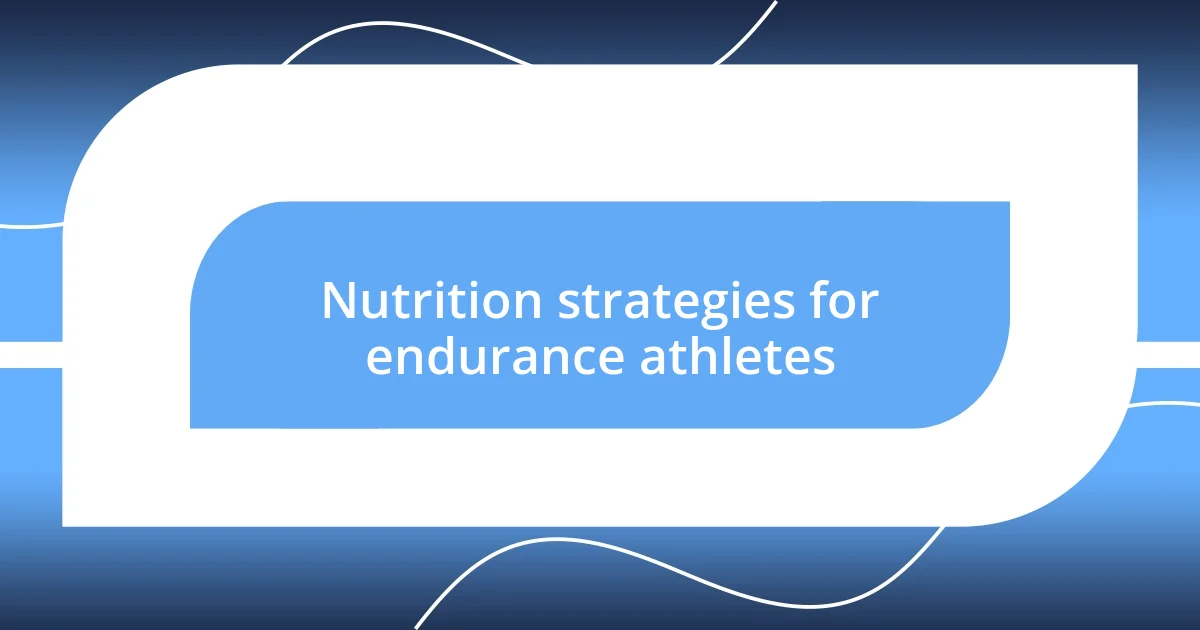
Nutrition strategies for endurance athletes
Endurance athletes often grapple with the challenge of maintaining energy levels over extended periods. I recall one particularly grueling marathon training session when I made a last-minute decision to bring along a homemade energy gel. It was a simple blend of honey and electrolytes, but it worked wonders! I felt a surge in energy that carried me through the toughest miles, transforming what could have been a struggle into a triumphant experience. It became clear that having lightweight, easily digestible sources of energy available during long workouts was essential.
I also believe in the importance of regular meals to maximize performance. During a training cycle, I made it a habit to plan out my meals and snacks meticulously. I found joy in prepping nutrient-dense food options like whole grains, lean meats, and vibrant vegetables, knowing each bite was an investment in my performance. Have you ever tried preparing meals that align perfectly with your training needs? It might seem tedious, but I promise that the payoff when it comes to endurance is worth the effort.
Finally, don’t underestimate the power of recovery meals. After completing a long run, I often look forward to a hearty post-workout meal. One of my favorites has become a quinoa bowl topped with black beans and avocado, offering a perfect blend of protein and healthy fats to replenish lost nutrients. After such meals, I’ve noticed how my body feels rejuvenated, as if it’s ready to tackle the next challenge. Remember, the right nutrition strategy isn’t just about the workout; it’s the lifeline that fuels our journey toward performance goals.
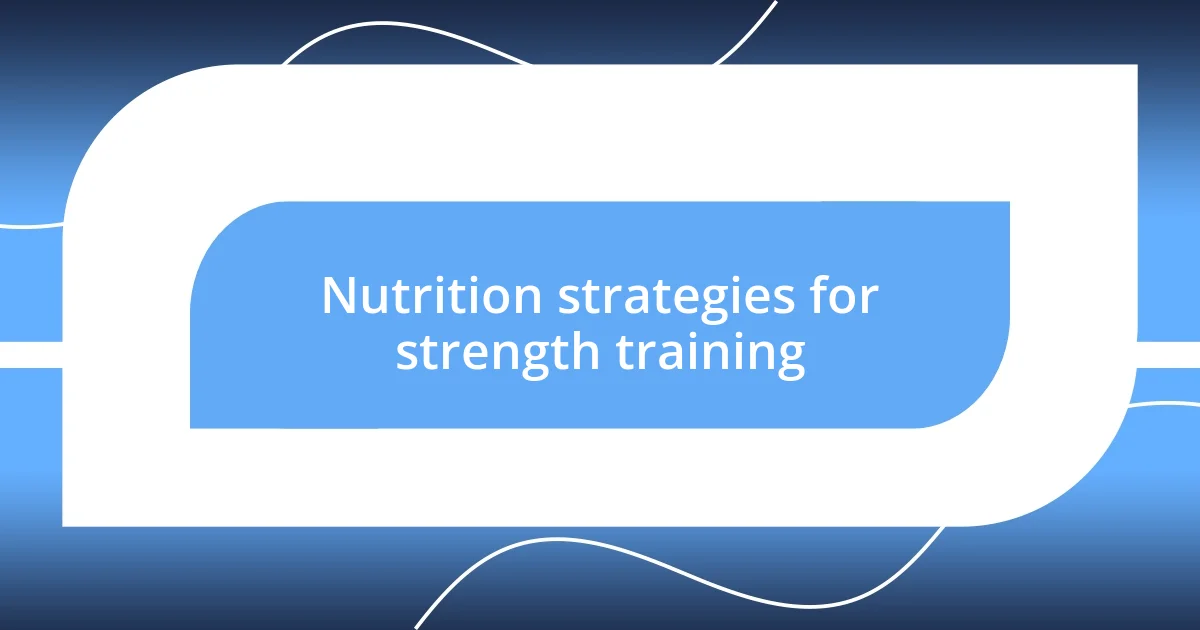
Nutrition strategies for strength training
Nutrition plays a pivotal role in maximizing strength training potential. I’ve experienced firsthand how the right balance of macronutrients can fuel workouts. For instance, after adjusting my intake of healthy fats—like avocados and nuts—I noticed a significant boost in my energy levels during lifts. It got me thinking: are you truly fueling your body adequately?
In my journey, I’ve discovered that consistency matters just as much as variety when it comes to nutrition strategies. One memorable period was when I committed to meal prepping each week, packing my lunches with lean proteins, veggies, and whole grains. I found that not only did this save time, but it also kept my body primed for performance. How often do you find yourself scrambling to eat healthily? Planning ahead can make a world of difference.
And let’s not forget about hydration—it’s often overlooked, but a game-changer in strength training. I’ve learned the hard way that being even slightly dehydrated can dull my performance. In fact, sipping water mixed with electrolytes before and after my workouts has transformed my recovery. It’s incredible how vital hydration is. So, are you drinking enough water, especially as you push your limits? Keeping a water bottle handy has made it easier for me to stay on track.

Assessing your nutritional needs
Assessing your nutritional needs is a crucial step in enhancing performance, and it’s something I take quite seriously. During one of my training phases, I decided to track my food intake using an app. It was eye-opening to see how easily I could fall short on essential vitamins and minerals just by focusing on macros alone. Have you ever calculated your nutrient levels? It might surprise you how much improving your diet can positively influence your energy and recovery.
Understanding what your body requires begins with knowing your activity level and goals. I remember adjusting my diet leading up to a big race, fueled by the need for greater endurance. I increased my carbohydrate intake while ensuring I was still getting enough protein for muscle repair. This balancing act made all the difference; my performance not only improved, but I also felt more energized throughout the day. How do you ensure your nutritional decisions align with your activity levels?
Lastly, consider how your body responds to different foods. I learned this lesson after a few challenging workouts where I felt sluggish. It turned out that certain pre-workout meals didn’t sit well with me. When I switched to easily digestible options like oatmeal and bananas before training, my stamina soared. Pay attention to how your choices impact your performance. Trial and error can be a great teacher, and the path to discovering what works for you can be both enlightening and rewarding. Have you taken the time to experiment with your meals?









